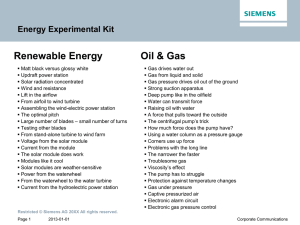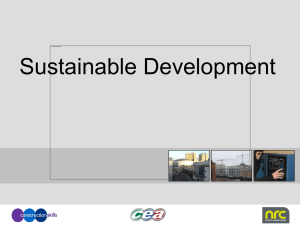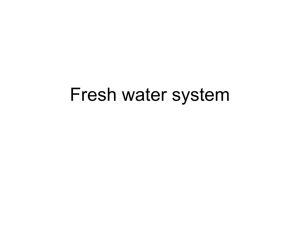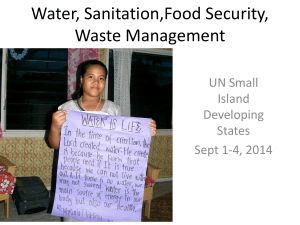Commercial Training 2014
advertisement
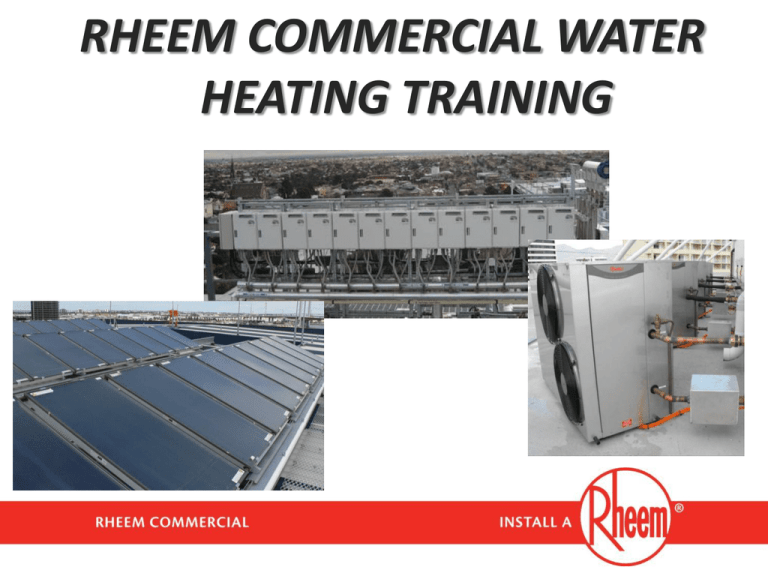
RHEEM COMMERCIAL WATER HEATING TRAINING TRAINING COURSE OBJECTIVES • • • • • • Introduction to Rheem Commercial Booklet Range appreciation Familiarise key design / installation criteria Introduction to manifolding Introduction to sizing Value added service Commercial Water Heating course contents • • • • • • • • • • • • Chapter 1 - Range overview - Commercial Booklet Chapter 2 - Heat Pump Chapter 3 - Commercial Solar Chapter 4 - Equaflow Manifolding Chapter 5 - Commercial Continuous Flow Chapter 6 - Commercial Storage Gas systems Chapter 7 - Raypak Heating and Hot Water Chapter 8 - Commercial Electric Chapter 9 - Guardian Warm Water Chapter 10 – Pump Sets Chapter 11 - Sizing and Selecting Chapter 12 - Commercial installation and design Chapter 1 Range Overview & Rheem Commercial Booklet Chapter 2 - Commercial Heat Pump COMMERCIAL HEAT PUMP LAYOUTS COMMERCIAL HEAT PUMP LAYOUTS Chapter 3 - Commercial Solar Commercial Solar • Terminology – Split / Pumped / Loline – Close Coupled / Thermosiphon / Hiline – Direct / Indirect (Premier Hiline) Commercial Solar Loline Commercial Solar Loline • Pumped system – Collectors and tank are split – Fluid is pumped between collectors and tanks – Can be on same level or different levels • Direct system – Consumed water passes through the collectors – Partial frost protection • In series boost Commercial Solar Loline • 325L and 410L vitreous enamel storage tanks – Manifold tanks as required • NPT200 collector – Painted aluminium selective surface – 7 riser tubes – Good performance in all regions Commercial Solar Loline • Frost – Limited frost protection – Frost sensor strategy – Electric or gas frost heater • Secondary Solar Recirculation – Maximum solar energy use – reduces energy use • BMS output – Run and fail status Commercial Solar Premier Hiline Commercial Solar Premier Hiline • Thermosiphon system – Collectors and tank are close coupled – Fluid rises through collectors naturally to tank – Tank is always above collectors • Indirect system – Transfer fluid passes through the collectors and transfers heat to tank via heat exchanger – Full frost protection • In series or in- tank electric boost Commercial Solar Premier Hiline • • • • 300L stainless steel tank Manifold systems as required 8 systems per array, multiple arrays possible S200 collector – Steel collector – Painted selective surface – Good performance in all regions Flat Plate vs Evacuated Tube Collectors Chapter 4 EQUA-FLOW BASICS EQUA-FLOW BASICS • Header diameters for cold/hot to be equal • Branch diameters for cold/hot to be equal • Hydraulic water flow “In one side, out the opposite” • Balanced performance per unit. Full delivery capacity from system In Line Flow direction In Flow direction Out EQUA-FLOW BASICS Flow direction Out Back to Back Flow direction In EQUA-FLOW BASICS 1 0+1+1=2 A 0 1 B PATH of LEAST RESISTANCE B 1 1 A 1 1 MORE EQUA-FLOW PRINCIPLES A B 1 2 0+2+1+1+2=6 1 1+2+2+1+0=6 1+2+1+2=6 2 ANGLED MANIFOLD 3 + bend 1 A 1 3 + bend B BACK TO BACK MANIFOLD 0.75 1 H2: 0.75+1+1 = 2.75 1 H4: 0.75+1+1 = 2.75 H6: 0.75+1+1 = 2.75 A B H1: 0+1+1+0.75 = 2.75 1 H3: 1+1+0.75 = 2.75 1 H5: 1+1+0.75 = 2.75 0.75 EQUAFLOW PRINCIPLES IN PRACTICE COMPLICATED EQUAFLOW PRINCIPLES IN PRACTICE When designing/ inspecting complicated manifolds consideration must be given to primary loops as well as hot and cold headers EQUAFLOW PRINCIPLES IN PRACTICE COMPLICATED EQUAFLOW PRINCIPLES IN PRACTICE BRANCHES • NEVER use non-return valves or pressure limiting valves in the branch – These create imbalance in the branches pressure • Non-return and reducing valves must be in a train on the cold water inlet COLD WATER SUPPLY TO WATER HEATER MANIFOLD BRANCHES • Last branch should be a T piece, not an elbow, to maintain equal resistance in all branches T PIECE Chapter 5 - Commercial CFWH RHEEM INDOOR CFWH – FLUE SYSTEMS USE MM AND FF ADAPTERS IF HORIZONTAL LENGTH OF HORIZONTAL TERMINATING FLUE EXCEEDS 2.7M TRIM RING USE CONDENSATE DRAIN & TRAP IF VERTICAL SECTION OF HORIZONTAL TERMINATING FLUE EXCEEDS 2M Rheem Multipak, Tankpak, Commpak and Commpak Plus Commercial Continuous Flow Hot Water Solutions Chapter 6 - Commercial Gas Storage RHEEM Commercial Gas Storage • • • • • • • • Work horse of the industry 3 input sizes – 50, 110, 200MJ/hr Indoor and outdoor models Multi-fin flue technology Flue damper Hot Surface Ignition Up to 82oC Room sealed flue HD Gas Layout 631275 Room Sealed Flue • Converts outdoor model to indoor room sealed • Ideal where no ventilation, contaminated air supply or fluing to roof impractical • 3m and 3 x 90o bends • Re-use flue terminal • Kit P/No 299135 Chapter 7 – Raypak Heating and Hot Water Raypak Layouts Chapter 8 - Commercial Electric Storage RHEEM Commercial Electric Storage • • • • • • • • Work horse of the industry 2 x 3 element models – 50 & 315L 1 x 6 element model – 315L Up to 36kW output Indoor and outdoor installation Heavy Duty enamel Larger anode Models up to 82oC HD Electric Layout Chapter 9 - Rheem Guardian Warm Water Chapter 10 - Pump Sets Deluxe Pump Sets • • • • • • • Deluxe Models UPS 20-60N and 32-80N pumps Individual Auto, Off, Manual switches Individual Run and Fail indicators Timer control Isolation and check valves included BMS output Standard Pump Sets • • • • • Standard Models UPS 20-60N and 32-80N pumps Single Auto, Off, Manual switch Timer control Isolation and check valves included Chapter 11 • Sizing and selecting... Energy Consumption It takes 4.2kJ of heat energy to raise 1litre of water (or 1 kg) of water 1 degree E = L x 4.2 x dT Example : To raise 500 litres by 32 degrees (from 10C to 42C) Energy consumption = 500 x 4.2 x 32 = 67,200kJ or 67.2MJ Plant efficiency must also be considered. If the plant operates at 80% efficiency, then; Energy required = 67.2 / 0.8 = 84MJ Typical Hot Water Usage Assumptions Offices Office peak period 60 minutes – Water per person 0.5 litres – Area per person 10m2 – Occupants Gymnasium peak period 30 minutes – Water per person 25 litres Typical Hot Water Usage Assumptions Food Service Restaurant Peak Period – 2 hours (temperature requirements) – Bistro per Meal – Coffee Shop per Meal – Auditorium per Meal – Restaurant per Meal – Takeaway Shop per Meal – Café per Meal – Hotel Kitchen per Meal 5.0 litres 3.5 litres 3.0 litres 5.5 litres 3.0 litres 6.0 litres Typical Hot Water Usage Assumptions Apartments Peak period 60 minutes – – – – – – – – Bed-sitter 1 Bedroom 2 Bedroom 2 Bedroom w/en suite 3 Bedroom 3 Bedroom w/en suite 4 Bedroom Penthouse 25 litres 40 litres 70 litres 75 litres 80 litres 90 litres 100 litres 150 litres Typical Hot Water Usage Assumptions Motel Motel peak period 60 minutes (Assume 2 people per room) – Shower 1 & 2 Star – Shower 3 Star – Shower 4 Star – Shower 5 Star – Shower Family/Spa 20 litres /person 25 litres /person 30 litres /person 45 litres /person 100 litres /person Sizing example... • • • • • • Motel 100 rooms 5 star accommodation Central electric plant Moderate climate Refer to commercial booklet... Sizing example... Motel • Showers = 50 x 2x 45 = 4,500L/1hr peak • Moderate climate = 50oC rise • Central electric plant: – 5 x 616315 with 6 x 6kW elements Hot Water Usage Assumptions Nursing Home Peak period 180 minutes – Bedpan 2.5 litres / bed – Shower 25 litres / bed – Cleaning water 10 litres / bed – Water per meal 5.5 litres Laundry peak 300 minutes – Laundry (1.2kg per bed) 10 litres / kg Selecting a water heating system • • • • • • • • Usage profiles...Have they changed? Peak Period in Litres/hr (e.g. 1hr) Redundancy Daily Load in Litres (Solar)... Water delivery Temperatures Plant Location - Indoor or Outdoor Flue location & termination (room sealed?) Circulation Systems...considerations Sporting Facility Case Study Football Club - Tasmania Sizing example... • • • • • Local football club 15 shower outlets @ 6 litres per minute (hot) 35 players inc umpires Commercial heat pump system Refer booklet... Sizing example... • • • • • • • • Players and Umpires = 35 Shower time, say 10 mins Peak duration = 30mins Showers = 35 x 6L/min x 10 = 2,100 litres Plant selection: 6 x 610430 storage tanks 1 x 953022 heat pump Recovery @10C ambient =244L/hr = 9hrs SELECTION & SIZING... • Diversity... • The difference between the maximum possible load on a water heating system if all outlets were in use at once and the “likely” load at any given time. • Example... • In a multi story accommodation building, only a predictable percentage of taps will be turned on at any given time, however it can be expected that all taps in a shower block of a sporting facility can be turned on at once and will require full heated water flow. SELECTION & SIZING CFWH PLANT or STORAGE PLANT... What to consider? • • • • • • • Footprint availability e.g. solar Storage volume? Maintenance/removal Flow rates Gas and water pressure Fluing Energy/fuel types Chapter 12 • Commercial Installation and Design Requirements 82oC Dead Leg Operation Primary Pump Requirements • Used for Raypak, Solar and Heat Pump • Non return valve is not required after primary pump. • Spindle must be horizontal • Pump is not weather proof – must be covered Isolation Valve Primary Pump NOT EQUA-FLOW PUMP SPINDLE VERTICAL Clearances CASE STUDY #2 Rheem Commercial Water Heating Systems Rheem Solar preheated, gas storage with a warm water system. Commercial application – Large nursing home Including a commercial laundry Commercial kitchen Commercial sinks Electric boost on sink Commercial dishwashing machine Water must be at sanitizing temperature i.e. 77 degrees The solar array To achieve the energy rating for the building, solar has been chosen. Often solar is a preferred method to achieve the energy reduction on site. Note - north facing collectors Note - the fall protection The panels are set in two arrays of 8 collectors 16 Rheem solar panels – ‘primary source of heat’ Each square meter(approx) of panel requires approx. 60 litres of solar storage tank capacity! Collector connections Primary flow and return to solar panels. Temperature probe wired to solar controller and to the circulating pump. It works on a 8 degree C differential. Automatic air eliminator on the return line out of the panels. The return hot water line to storage tanks Note the pipe insulation to reduce heat loss which is measured in ‘ watts ‘ per meter Lagging must be UV resistant and meet AS3500.4 Four Rheem 430 litre solar storage cylinders ( 1720 litre capacity ) Rheem Gas boost mains pressure storage units. Rheem Solar controller Green light indication of system cycle. Note - the solar return pipe work from the panels. Primary flow and return from solar panels Note – the isolation valves Note – the pipe lagging Commercial site assistance THANK YOU FOR YOUR TIME TODAY • We trust you have enjoyed and benefited from this training course...



